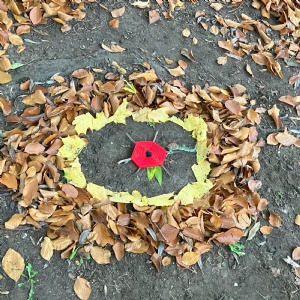
Stephen Perse Cambridge Year 6 mark Remembrance Day with poetry, music and art
Published on 18/11/24

On a crisp November morning, Year 6 students from Stephen Perse Cambridge Junior School gathered at Latham Road Sports Ground to honour Remembrance Day. As part of their learning for the Sticks & Stones topic, they engaged in thoughtful activities that deepened their understanding of remembrance and respect.
The day began with an introduction to the tradition of the poppy as a symbol of remembrance. The pupils had read the poem ‘In Flanders Fields’ by John MacCrae in English class and learnt how the poppy became a symbol of remembrance after World War One. Poppies represented the blood spilled in war and were a symbol of hope as they were the first new life to return to the scarred landscape of Northern France and Belgium after the end of the war. The pupils crafted their own poppies, using wool and sticks to create beautiful "God’s Eye" weavings. These vibrant handmade poppies became a meaningful emblem of the day’s theme. Henry said, ‘I enjoyed making the poppy from wool and sticks with my group. I loved being outside although the grass was very wet and got my socks wet!’
The group paused to observe a two-minute silence around a wreath they had made using all their poppy weavings. This solemn moment was accompanied by the poignant sound of The Last Post, skillfully played by Mr McDowell. The pupils used the time respectfully, taking a moment to think of those who have served in the armed forces and those who have lost their lives in war. Devin commented, ‘Mr McDowell played a piece that made us feel grateful and sorry for those who lost their lives during conflict. Two minutes of silence gave us a chance to appreciate everyone who fought in war. Overall, the experience has made me feel joyful and grateful.’
After break, the pupils explored natural art by incorporating rosemary sprigs with their poppies to create artworks inspired by the theme of remembrance. The addition of rosemary to their creations is due to the herb’s traditional use as a symbol of remembrance, as mentioned by Ophelia in Hamlet. The students arranged these materials thoughtfully, using a variety of materials such as autumn leaves, twigs, pine needles and holly to create evocative memorials. Jasmine said that, ‘The artwork with nature was fun because everyone had different creative ideas to help make it look good.’
Once they had returned to school, the pupils read War Game by Michael Foreman with their class. This book is a poignant story of four friends who decide to enlist in the army during World War One. The book is fictional, but helps pupils to learn about propaganda, trench warfare and the famous Christmas football match in 1914. At the end of the book, the scale of the loss suffered in World War One became apparent and we discussed why it is important to remember the millions who died during the war.
Year 6’s time at Latham Road offered them a chance to connect personally with Remembrance Day, fostering a deeper appreciation for the sacrifices of those who came before them. They used lots of the thinking toolkit during this learning. Evelyn noted that, ‘we used collaboration to make the poppies’, while William B noticed he had used ‘creative thinking to make our outdoor artwork’.